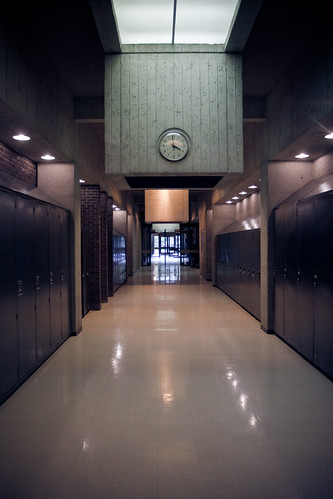I've never been completey satisfied with the shelving situation in my home. The lad and I both owned a lot of books, but we had very different dreams about how those books should be displayed. Hardly a shocking revelation. Needless to say, the solution we did decide upon was practical and affordable, but although not displeasing aesthetically it only just fit our book collection (when they were doubled up and very tightly packed). Now the shelves are not so tightly packed and I continue to dream about the day when I can afford to redo that part of the house. Add a little colourful and eclectic flair to an otherwise cold space.
This was me in Vancouver waaay back in 2006. I was in town for the World Urban Forum III and met up with a flickr friend for a little portrait session. So much has changed since then. One thing has stayed constant though. I continue to make friends through photography.
This weekend I'm headed to Vancouver again, this time for my cousin Marc's wedding (where I am the official photographer). Acting as my assistants are two of my bestest boy friends, both of whom are brilliant photographers themselves. The weekend will be full of photographic delights. I cannot wait to go. I am positively giddy with excitement.
I am so ready for this trip.
As promised, here's my extended rant about Schwarzenegger and the textbook ban. I'm surprised I haven't heard more about this in the news. I first came across the story nearly a month ago and it's been sitting in the blog queue since then. Good thing I read lots of heavy books because now I can flex some pretty impressive writing muscles.
I decided that this topic warranted a bit more reading (I wanted some scholarly advice), so after a trip to Google Scholar I came upon this article from by Wendy Sutherland-Smith, Weaving the literacy Web, Changes in Reading from page to screen (The Reading Teacher, Newark: Apr 2002. Vol. 55, Iss. 7; pg. 662, 8 pgs). The abstract drew me in, Sutherland-Smith explores the unique reading strategies needed for the World Wide Web. She considers additions needed in the repertoire of teaching reading strategies when computers are the medium. Although written in 2002, the strategies she proposes are still relevant and probably still not as widely known as they should be. While I will quote extensively from the article, I do suggest that you click through and read it.
This textbook ban has more far-reaching implications that just being a cost-saving measure. It will have a significant impact on literacy (both positive and negative). According to the UNESCO position paper on The Plurality of Literacy and its implications for Policies and Programs 'literacy' is the ability to identify, understand, interpret, create, communicate, compute and use printed and written materials associated with varying contexts. Literacy involves a continuum of learning to enable an individual to achieve his or her goals, to develop his or her knowledge and potential, and to participate fully in the wider society. It's a no brainer that literacy is important. But as Sutherland-Smith states, "Clearly, literacy is not a static concept. Leu (1997) saw it as a "deictic" term, because "it's meaning is continually changing, dependent upon the technological context in which it occurs" (p.62). So what is meant when we talk about web literacy? Sutherland-Smith explains,
More from Sutherland-Smith,
Mr. Schwarzenegger announced the ban on textbooks in a classroom in Sacramento, holding up four large text books and joking: "I can use these for the (bicep) curls."There's just something so wrong about that statement. Why Arnie? Why?
"Textbooks are outdated, in my my opinion," he said. "For so many years, we've been trying to teach exactly the same way. Our kids gets their information from the internet, downloaded onto their iPods, and in Twitter feeds to their cellphones... Basically kids are feeling as comfortable with their electronic devices as I was with my pencils and crayons. So why are California's school students still forced to lug around antiquated, heavy, expensive textbooks? (via Telegraph.co.uk)Isn't anyone else concerned by this? Or at least the tiniest bit curious about the implications of banning textbooks in the classroom? Maybe it's just the wannabe academic in me, but this topic both depresses and intrigues me. I'm fascinated by the cognitive changes that have come about due to shifts in technology, particularly when it comes to reading. Compare reading a newspaper to an article online. The differences are not so subtle. Our eyes move across the text in new patterns, our level of concentration varies, our mind wanders. Reading text on a physical page versus reading text on a screen is very different. One does not simply replace the other. Like Neil Postman said, "technology giveth and technology taketh away." I wonder how much thought the Californians have given to this.
I decided that this topic warranted a bit more reading (I wanted some scholarly advice), so after a trip to Google Scholar I came upon this article from by Wendy Sutherland-Smith, Weaving the literacy Web, Changes in Reading from page to screen (The Reading Teacher, Newark: Apr 2002. Vol. 55, Iss. 7; pg. 662, 8 pgs). The abstract drew me in, Sutherland-Smith explores the unique reading strategies needed for the World Wide Web. She considers additions needed in the repertoire of teaching reading strategies when computers are the medium. Although written in 2002, the strategies she proposes are still relevant and probably still not as widely known as they should be. While I will quote extensively from the article, I do suggest that you click through and read it.
This textbook ban has more far-reaching implications that just being a cost-saving measure. It will have a significant impact on literacy (both positive and negative). According to the UNESCO position paper on The Plurality of Literacy and its implications for Policies and Programs 'literacy' is the ability to identify, understand, interpret, create, communicate, compute and use printed and written materials associated with varying contexts. Literacy involves a continuum of learning to enable an individual to achieve his or her goals, to develop his or her knowledge and potential, and to participate fully in the wider society. It's a no brainer that literacy is important. But as Sutherland-Smith states, "Clearly, literacy is not a static concept. Leu (1997) saw it as a "deictic" term, because "it's meaning is continually changing, dependent upon the technological context in which it occurs" (p.62). So what is meant when we talk about web literacy? Sutherland-Smith explains,
Web Literacy is a term for finding, scanning, digesting, and storing Internet information. It is "an ability to recognize and assess a wide range of rhetorical situations and an attentiveness to the information conveyed in the source's non-textual features" (Corapure et al. 1998, p.410). This understanding is significant, as it represents a "fundamental change" (Leu, 2000, p. 424) in thinking about being literate in the 21st Century. The speed and degree of change that Web literacy brings to teaching reading is an implementation challenge for us teachers. As Sorapure et al. pointed out, the web is a "vast, open , and uncategorized library, and one in which reference librarians are nowhere to be found" (p.410). The Internet can be an intimidating and difficult medium to manage, with its constant rapid changes, but technology skills are essential for survival in the 21st century. Therefore students and teachers must be competent and more important, comfortable with the medium... Web literacy demands an incorporation of key reading or navigation skills. These include accessing information, analysing information (including multimedia), and processing procedures to store or move text. While these skills appear to be the same as those used with print text, academic writers tend to agree that Web literacy involves expanding critical reading skills to incorporate evaluation of visual and nontextual features and a greater use of associative logic (see Bolter, 1991; Burbules, 1997; Charney, 1994; Leu, 1996; Reinking, 1998; Shetzer and Warschauer, 2000; Snyder, 1999).I do think Arnie was right about one thing (or at least I agree with the sentiment he was trying to convey), the way we access the majority of our information has changed and continues to change. Although where he gets this idea that kids are the ones on Twitter I'm not quite sure... and maybe the iPod Touch is more ubiquitious in California, but I don't think that kids are accessing the majority of the information they access online through their mp3 payers, nor do I think its a reasonable comparison to parallel pencils and crayons to electronic devices. Nevertheless, I do think it's important that we adjust to those shifts in information access. But we need to keep in mind that technology is not neutral, and we shouldn't just cast aside the old ways of doing things in favour of some glossy new 'improvement'. Surely that's common sense. However, as Sutherland-Smith continues, when it comes to technology in education some advocate an even more extreme approach.
Having written about Postman before, it's not secret that I am a fan of his views about how technology is affecting society. However, I'd like to put it forward that I am not against the integration of technology in the classroom. Quite the contrary really, I'm a big proponent of it. However, it needs to be done properly. I've worked in a setting where new and exciting technology had been introduced to students without the majority of the teachers having any understanding of how to properly use the tools or integrate them into the curriculum. It was maddening to see how both the students and teachers were struggling to use the tools effectively. Although there were a select few who managed to use the tool to their advantage, for the majority, due to the lack of appropriate instruction (for both teachers and students), the technology proved to be more of a hindrance to any real progress (albeit a flashy and exciting one). I don't think the teachers were to blame for this (many didn't have any choice about whether or not the technology would be used in the classroom, they were told it had to integrated but then not given appropriate direction how to do so). It was more a fundamental problem with the way this particular program was rolled out. It was almost as if the technology came first and then a problem was sought out for that technology to solve. But that's a backwards approach.Many writers oppose using technology in classrooms and advocate a critical approach to the issue of technology. Birkets (1994) and Postman (1995) believed that the advent of computer technology will lead to an impoverishment of the English language. They contended that poor concentration skills in dealing with lengthy and deep textual reading, poor writing skills, and a superficial understanding of issues, due to the lack of depth in reading, will result from Technology in English teaching classrooms. Stoll (1995, p.26) added that he "rarely finds prose that's articulate and create" from the "mediocre writing and poorly thought-out arguments" of Internet-based writing. Leu (1996), whilst supporting the advent of digital literacy, advocated that we keep the concerns of Birkerts (1994) and Stoll (1995) in mind, or "we may become familiar with much but understand little" (p.163).
More from Sutherland-Smith,
I think what bothers me most about this textbook ban is the seeming lack of critical perspective. When the "problem" that is being solved with the ban of textbooks/introduction of tecnology in the classroom is the state of the Californian economy, it is difficult for me to believe that the state of education is really being taken into consideration. As if technology will somehow save California from bankruptcy. Doesn't it seem that any money that is saved will be at the expense of the students? What's the point of introducting a new technology in a classroom if the teachers and students aren't given the appropriate support? It's not as simple of replacing a book with an electronic version. Where is the money for improved infrastructure, will there be enough computers for all of the students? What about the digital divide - not everyone has a personal computer. What about the implications of reading from the internet? Do all teachers have the knowledge/training/understanding to provide students with appropriate strategies for how to read and learn from online material? It's not an even swap. Switching mediums opens up a whole new world of possibilities and challenges. It's sort of like stuffing a square peg into a round hole. In the words of the philosopher Derek Zoolander, "How can we be expected to teach children to learn how to read if they can't even fit inside the building?"As a teacher operating in both print-based and technology mediated classrooms, I
consider it crucial to institute that critical evaluation of the manner in which technology is used in the classroom. This means not only evaluating reading and writing products or technology programs, but also investigating whether technology is being used simply because it is technology (see also Lankshear, Snyder & Green, 2000). It is, however, implausible that the impact that the Internet is having on society and education can be ignored. In fact, "the Web has already entered our classrooms as we debate its value and its effects." (Sorapure et al. 1998, p.412), and we, as teachers, must weave the expanding web of technology into our classroom
practice....a critical perspective must be maintained as to the purposes and appropriateness of technology in our classrooms, as teachers we are required to assist our students with new Web text reading strategies. In addition, we need to become "technology critics as well as technology users" (Selfe & Selfe, 1994, p.484) in order to effectively implement education policy for our students.
This post has been simmering on the backburner for nearly a month. It's about time I gave it some attention. The problem is, I'm not really in the mood to finish it. But I will make my best attempt.
Certain things alarm me. One such thing is ignorance, another is bone-headed attempts to save money at the risk of significant cultural and cognitive change (so I guess there is really only one thing). This rant is inspired by my being alarmed... alarmed by the news of the Terminator's plan to phase out school text books in favour of internet aids and by the passing of Bill 44 (a topic I've avoided discussing until now because it depresses me so). All this on the heels on my attempts to write a more positively flavoured post about some of the more encouraging stories I've read lately (The Equity Project, A New Liberal Arts). But since I have to start somewhere I'll start with the good news (and perhaps even just end there too).
Somewhere, buried under a series of useless status updates and vanity posts on facebook and twitter, there exists a link to TED lecture given by Bennington College President Elizabeth Coleman about reforming higher education, moving away from increasingly narrow areas of study to a truly cross-disciplinary education, one that dynamically combines all areas of study to address the great problems of our day. Is this just a lofty goal or much needed radical rethinking of education?
It seems forever ago that I watched this particular video, but at the time I was mindful enough to write down some of Liz Coleman's comments that I found most thought provoking, particularly what she had to say about civic consciousness. Perhaps it has been my recent immersion in the world of municipal politics, but I've been thinking recently about what makes a good citizen and the role that education plays in shaping that good citizen.
I had more planned for this post, but it's getting late and I think the topic of Schwarzenegger and the textbook ban is deserving of its own rant. I have more to say about the plan for a new liberal arts too, but this topic is almost a bit too intellectual for me to process at the moment. I have other things on my mind. But as always, the benefit of this blog is that I can stop and start writing about things as I please.
Certain things alarm me. One such thing is ignorance, another is bone-headed attempts to save money at the risk of significant cultural and cognitive change (so I guess there is really only one thing). This rant is inspired by my being alarmed... alarmed by the news of the Terminator's plan to phase out school text books in favour of internet aids and by the passing of Bill 44 (a topic I've avoided discussing until now because it depresses me so). All this on the heels on my attempts to write a more positively flavoured post about some of the more encouraging stories I've read lately (The Equity Project, A New Liberal Arts). But since I have to start somewhere I'll start with the good news (and perhaps even just end there too).
Somewhere, buried under a series of useless status updates and vanity posts on facebook and twitter, there exists a link to TED lecture given by Bennington College President Elizabeth Coleman about reforming higher education, moving away from increasingly narrow areas of study to a truly cross-disciplinary education, one that dynamically combines all areas of study to address the great problems of our day. Is this just a lofty goal or much needed radical rethinking of education?
It seems forever ago that I watched this particular video, but at the time I was mindful enough to write down some of Liz Coleman's comments that I found most thought provoking, particularly what she had to say about civic consciousness. Perhaps it has been my recent immersion in the world of municipal politics, but I've been thinking recently about what makes a good citizen and the role that education plays in shaping that good citizen.
Civic consciousness and behavior are formed at the intersection of study and engagement - reflection and action - and in public settings where difference and conflict are plentiful and treated as assets, instead of liabilities.Although Coleman later related these comments to a post-secondary context, I don't see the harm in looking at them in the more general terms, for example the public school system. After all, what should public school be other than the ultimate form of general studies preparing us for life. I don't think it's far fetched to wish that education be used as a way to develop good citizens. And I don't just mean devoting a small portion of the social studies curriculum to civics. Being a good citizen is more than just understanding how decisions are made - it's also about being able to deal with conflict and difference and still being able to make society function. And dealing with these issues does not include segregating ourselves or escaping into a cocoon of ignorance. But isn't that exactly what Bill 44 allows? What is wrong with a little bit of controversy? And who determines what is controversial? Why do we have no trust in our educators?
I had more planned for this post, but it's getting late and I think the topic of Schwarzenegger and the textbook ban is deserving of its own rant. I have more to say about the plan for a new liberal arts too, but this topic is almost a bit too intellectual for me to process at the moment. I have other things on my mind. But as always, the benefit of this blog is that I can stop and start writing about things as I please.





